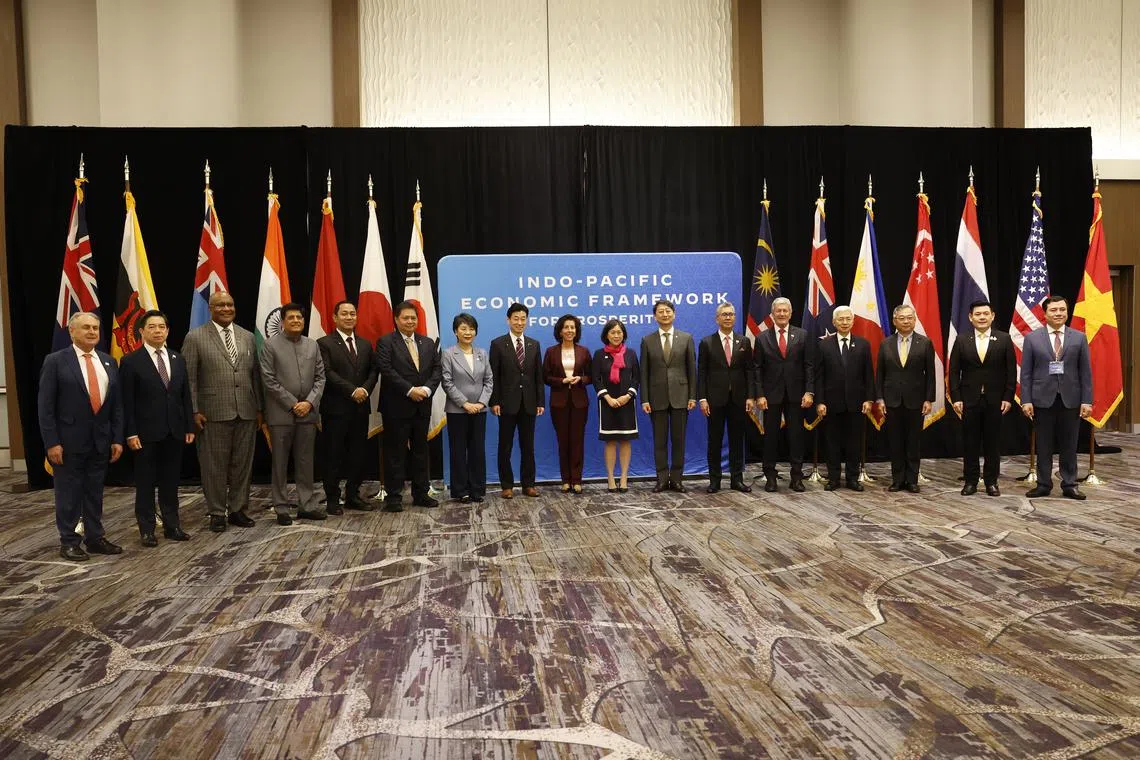Singapore, US and IPEF partner countries agree on lowering carbon emissions and corruption
Sign up now: Get ST's newsletters delivered to your inbox

Minister for Trade and Industry Gan Kim Yong (third from right) posing with other delegates for a family photo during a ministerial meeting at the Apec summit.
PHOTO: EPA-EFE
SINGAPORE - Singapore, the United States and 12 other Indo-Pacific countries have concluded agreements aimed at lowering both carbon emissions and corruption, the Ministry of Trade and Industry (MTI) said on Thursday.
Singapore, which is part of the Indo-Pacific Economic Framework for Prosperity (IPEF) group of countries,
The group also made progress on the IPEF Trade pillar that seeks to develop high-standard, inclusive, free, fair, and open trade commitments built upon the rules-based multilateral trading system.
Minister for Trade and Industry Gan Kim Yong said: “The signing of the Supply Chain Agreement, and the substantial conclusion of the Clean Economy and Fair Economy agreements, will create opportunities for Singapore businesses and help them expand in the region and internationally.
“They (the agreements) will provide more opportunities to secure investments and participate in the development of new climate solutions, and help establish an even more conducive business environment for companies looking to expand abroad.”
He said Singapore will work closely with IPEF partners to implement these agreements and quickly realise their full potential, while continuing to work closely with partners to realise positive and cooperative outcomes in the Trade pillar.
The IPEF Clean Economy Agreement will advance regional cooperation to accelerate deployment of clean energy technology, develop offshore electricity infrastructure for unrestricted cross-border electricity trade, and promote carbon market activities.
It will also allow partners to collaborate on regional and international Carbon Capture, Utilisation and Storage (CCUS) value chains, reduce non-tariff barriers to trade of low- and zero-emissions goods and services, and promote sustainable transport, among others.
US Commerce Secretary Gina Raimondo said the Clean Economy Agreement will create avenues for more private investment into IPEF member countries, helping them accelerate their transitions to low-carbon energy sources.
These include a US$30 million (S$40.4 million) Catalytic Capital Fund that will help develop “bankable” clean energy products and provide countries with technical assistance. A separate group of private sector firms and non-profit groups will focus on mobilising climate investments in IPEF countries under a climate fund.
At the invitation of the US, Singapore will also host the inaugural IPEF Clean Economy Investor Forum in the first half of 2024.
Under the IPEF Fair Economy Agreement, partners committed to strengthening their implementation of anti-corruption measures and taxation initiatives to boost commerce, trade and investment by promoting a fair and transparent regional business environment.
The agreement also asks IPEF partners to enhance their efforts to combat corruption, including bribery, and support efforts to improve tax transparency and the exchange of information, domestic resource mobilisation and tax administration.
The Clean Economy and Fair Economy agreements will undergo legal scrubbing before they are signed and subsequently ratified. Ministers will meet annually to oversee the implementation of the IPEF, the MTI said.
The two agreements came after the IPEF Supply Chain Agreement, which was substantially concluded earlier this year in May, was signed in San Francisco on the sidelines of the Asia-Pacific Economic Cooperation (Apec) Summit.
IPEF countries, which comprise Australia, Brunei, Fiji, India, Indonesia, Japan, South Korea, Malaysia, New Zealand, the Philippines, Thailand, Vietnam and Singapore in addition to the US, will now put the pact through their respective domestic ratification procedures to bring it into force.
The IPEF, launched in Tokyo on May 23, 2022,
The IPEF Supply Chain Agreement is the first multi-country pact to strengthen the resilience and connectivity of supply chains and mitigate risks of economic disruptions through collective and individual actions.
The IPEF partners will establish coordination bodies to enable parties to work together on supply chains, including by developing deeper shared understanding of regional supply chains, improving crisis response capabilities, sharing information and best practices, facilitating business matching and investments, and promoting supply chain resilience in critical sectors and key goods.
Under the pact, IPEF nations will also promote labour rights and workforce development.
Correction note: This article has been updated for accuracy.



